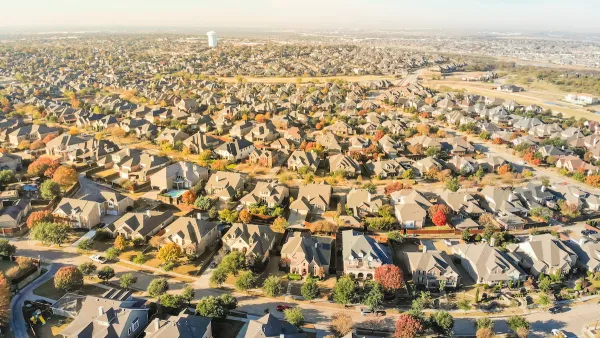In this excerpt from her new book, "Before the Lights Go Out" author Maggie Koerth-Baker warns of the converging crises of peak oil and climate change on suburban areas.
Using Merriam, Kansas as an example of the typical American suburban environment, Koerth-Baker considers the impacts of what the current science predicts will be a hotter, wetter world with less and more expensive oil:
"Metro towns aren't self-reliant. Their fates have been tied to the fates of the towns they touch for decades. That interconnection works now because gasoline is cheap. What happens to a metro town when travel from one part to another is no longer easy and frequent, no longer something that can happen daily or hourly? What happens when the parts of a metro can no longer rely on the direct support of all of the others but are still on the hook for funding shared systems? What happens to the city at the metro's heart when it can no longer count on the social support, the financial investments, and the intellectual capital of people who actually live elsewhere?"
We have two problems: our metro lifestyles require energy, but we also want to avoid the negative impacts climate change and peak oil will have on metro communities."
FULL STORY: Spread Reckoning

National Parks Layoffs Will Cause Communities to Lose Billions
Thousands of essential park workers were laid off this week, just before the busy spring break season.

Retro-silient?: America’s First “Eco-burb,” The Woodlands Turns 50
A master-planned community north of Houston offers lessons on green infrastructure and resilient design, but falls short of its founder’s lofty affordability and walkability goals.

Delivering for America Plan Will Downgrade Mail Service in at Least 49.5 Percent of Zip Codes
Republican and Democrat lawmakers criticize the plan for its disproportionate negative impact on rural communities.

Test News Post 1
This is a summary

Test News Headline 46
Test for the image on the front page.

Balancing Bombs and Butterflies: How the National Guard Protects a Rare Species
The National Guard at Fort Indiantown Gap uses GIS technology and land management strategies to balance military training with conservation efforts, ensuring the survival of the rare eastern regal fritillary butterfly.
Urban Design for Planners 1: Software Tools
This six-course series explores essential urban design concepts using open source software and equips planners with the tools they need to participate fully in the urban design process.
Planning for Universal Design
Learn the tools for implementing Universal Design in planning regulations.
EMC Planning Group, Inc.
Planetizen
Planetizen
Mpact (formerly Rail~Volution)
Great Falls Development Authority, Inc.
HUDs Office of Policy Development and Research
NYU Wagner Graduate School of Public Service





























